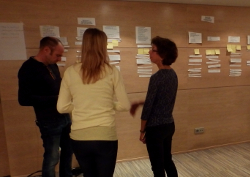Position of trainer as a facilitator
Approaches in the socio-critical paradigm :
These implicate the learners and trainers in collaborative investigations in response to a complex given problem which does not allow for a single response, or in ethico-scientific debates.
They render explicit the contradictory nature of agroecological issues. They enable either development of awareness of these issues or discussion of the related conceptions and values within a group of learners.
Resources
To show the complexity of a problem :
To show the complexity of controversies :
To create a socio-cognitive conflict (individual one) :
- @ Q-sort - Method
- @ Q-sort about agro-ecology
- @ Moving debate
- @ CLIM
- @ Forum theatre
- @ Role game
- @ Role game : knowledge transmission from breeder to sheeper
To create cognitive conflict :
To enrich knowledge of participants :
The way to exchange experience and knowledge of local teritories between farmers - practitioners with help of farmers' advisor as facilitator.
- @ World coffee
- @ Workshop on exchange and cocreating between farmers en scientists/agronomists/public servantsâ?¦
- @ Interface between training and professional sphere
- @ Workshop on exchange between farmers, ngo's of nature and citizens who live in the neighbourhood.
- @ Organise exchange and interventions between different actors in the implementation of agroecological knowledge (farmers, technicians, counsellors, researchers, decision makers, financiers, legislators).
Sensitive approach, imaginary one and playful approach even spiritual one :
- @ Playful and participative approach
- @ Imaginary and artistic approach : Vocals, land'art, alive painting, five senses games, drawingâ?¦
- @ Storytelling
- @ Reading landscape
- @ Sensitive approach of 'terroir'
To have a collective analysis of profesionnal practices :
Furthering your discovery of training itinerary :
@ Position of trainer as an expert or objectivist paradigm@ Position of accompaniment or subjectivist paradigm
@ Combining different positions
@ How to evaluate integration
@ Exploring agroecological knowledge

